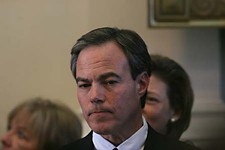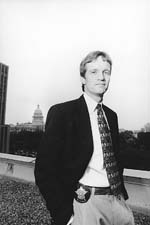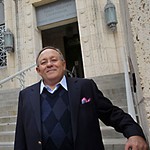Red-Light Cameras on Trial
State Reps. Fred Hill, Carl Isett Collide Over Red-Light Cameras
By Amy Smith, 6:51PM, Wed. May 16, 2007
Just for kicks, and because no one seems to have reported on the comedic aspect of Tuesday's House debate on a red-light camera bill, please allow us to recount a few delicious highlights. OK, the highlight was watching Lubbock Rep. Carl Isett squirm his way through an aggressive line of questioning before winning passage of an amendment that could force cities to trash their red-light camera programs.
Isett's victory followed his weak defense against sharpshooter Fred Hill, a former Richardson school board member and a staunch defender of local control. Hill put the younger Isett through the ringer in a drill that resembled the old Abbott and Costello riff, "Who's on First?"
The impromptu entertainment cropped up on third reading of Senate Bill 1119, which would officially authorize cities to use traffic cameras to catch red-light runners. The bill, which in its Senate version was largely supported by local municipalities, would also prevent cities from turning their camera operations into revenue-generating machines.
Isett's amendment calls for a state review of the program's effectiveness. If cities aren't able to prove the safety value of traffic cameras, the Legislature could vote in the next session to ban the high tech gizmos on city streets.
Isett is part of the Legislature's camera-hating crew angling to stick a fork in this new system of armchair traffic enforcement. On the other side of the debate, Hill and a minority of House members favor letting cities decide whether they want to use red-light cameras at busy intersections. Of course, Hill probably knew Isett's amendment would pass, but first he wanted to establish a finding of fact that Isett actually knows or cares little about how local governments function. Hill eased into position at the back microphone and opened fire. He asked Isett if he knew what the financial impact his amendment would have on cities already locked into financial and contractual commitments with camera-equipment companies.
"My guess is," Isett began, before Hill cut him off. "Are you going to guess at this?" Isett hemmed and hawed and finally acknowledged he wasn't familiar with cities' contractual arrangements. The two went back and forth a while longer until Isett touched a nerve with his claim that cities worm their way out of "bad contracts all the time," and therefore wouldn't suffer major financial consequences if the state directed them to yank the contracts and remove the cameras. "You and I both know," Isett said, "that most of these [cities] are on a lease system, and usually the camera companies put [the equipment] in for nothing."
"I don't know that," Hill replied testily. "You do, too!" Isett shouted – and immediately regretted the charge. "I'm sorry," he stammered.
"So, are you calling me a liar?" Hill demanded. Isett again apologized but Hill wasn't willing to let him off easily. "Let's address the question," Hill instructed, shaking his finger at Isett. "And do not tell me what I know and what I don't know."
"Yes, sir," Isett squeaked.
Hill resumed his third-degree examination. He asked Isett if he could name a city that wouldn't be on the hook for breaking a contract with a vendor. Yes, Isett replied, citing his hometown of Lubbock as one example.
"So your understanding is that if they were to … shut down this equipment, they would have no financial obligation?" Hill asked. Isett thought a moment and, for whatever reason, decided against answering in the affirmative.
Isett: "My amendment says –"
Hill: "That's not the question!"
Isett, by now clearly frustrated, finally acknowledged that his amendment "is silent" on the issue of cities' financial obligations.
"Because you don't know, is that correct?" Hill prodded. "Not only do I not know," Isett responded proudly, "I did not consider it. … It is not really considered [in the amendment]."
Hill seemed satisfied with Isett's admission. "Thank you," he said, and turned to leave the podium. "Please," Isett beckoned from the front podium. "I ask your forgiveness for what I said. I'm sorry."
Hill smiled slightly and leaned into the microphone. "Forgiveness is given," he said gravely.
In the end, Isett's amendment passed 81-55, but it's uncertain whether the added language will remain in the final version of the bill. Like the rest of the House, Austin-area representatives were all over the map on the vote. Dawnna Dukes, Elliott Naishtat, Eddie Rodriguez, and Patrick Rose voted in the majority, while Mark Strama, Valinda Bolton, Donna Howard, and Mike Krusee, the lone Republican of the bunch, rounded out the dissenting votes.
Got something to say on the subject? Send a letter to the editor.
A note to readers: Bold and uncensored, The Austin Chronicle has been Austin’s independent news source for over 40 years, expressing the community’s political and environmental concerns and supporting its active cultural scene. Now more than ever, we need your support to continue supplying Austin with independent, free press. If real news is important to you, please consider making a donation of $5, $10 or whatever you can afford, to help keep our journalism on stands.
Richard Whittaker, May 12, 2010
Richard Whittaker, Dec. 17, 2009
Richard Whittaker, Aug. 28, 2014
Richard Whittaker, June 24, 2014
Nov. 28, 2014
State Government, Legislature, Fred Hill, Carl Isett, red light cameras, Dawnna Dukes, Elliott Naishtat, Eddie Rodriguez, Patrick Rose, Mark Strama, Valinda Bolton, Donna Howard, Mike Krusee












